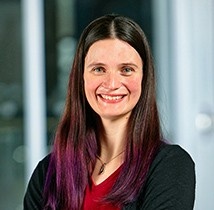Spring 2023 Research Highlights
By Dr. Brenda Beagan, Tara Pride and Kaitlin Sibbald

Dr. Brenda Beagan
Professor, School of Occupational Therapy
Research Topics:
- Equity, Justice, Diversity Inclusion
- Health Professional Education
- Professional Practice
- Social Inequities and Occupation
- Race Ethnicity and Racism
- Sexual and Gender Identity
- Social Class
- Disability/disabling

Tara Pride (PhD in Health Candidate)
Sessional Instructor, School of Occupational Therapy
Research Topics:
- Indigenous People's health
- Health care system inequities
- Health professional education
- Indigenous student experiences

Kaitlin Sibbald (Phd in Health Candidate)
Instructor, School of Occupational Therapy
Research Topics:
- Ethical implications of conceptual framing
- Epistemology and epistemic injustice
- Metaphor and the social construction of viruses
Professional Misfits: “You’re Having to Perform . . . All Week Long”
Brenda L. Beagan, Ph.D.; Kaitlin R. Sibbald, M.Sc., OT Reg (NS); Tara M. Pride, M.Sc., OT Reg (NS); Stephanie R. Bizzeth, M.Sc., OT Reg (NS)
Client-Centered Practice when Professional and Social Power are Uncoupled: The Experiences of Therapists from Marginalized Groups
Brenda L. Beagan, Ph.D.; Kaitlin R. Sibbald, M.Sc., OT Reg (NS); Tara M. Pride, M.Sc., OT Reg (NS); Stephanie R. Bizzeth, M.Sc., OT Reg (NS)
These papers come from a larger study where we interviewed occupational therapists, nurses and physicians across Canada who self-identified as racialized (Black or people of colour), 2SLGBTQ+, disabled, ethnic minority, or from working-class or impoverished family origins. Though COVID cut short our data collection, we ended up with 49 participants. Our larger team from across Canada includes researchers from all of the groups in the study. In addition to the three of us, authorship on these two papers specifically included African Nova Scotian OT Stephanie Bizzeth. We have written several other papers on specific experiences of racism, classism, ableism, and heterosexism in specific professions or across professions. As we met weekly to think through the data, the idea of ‘misfits’ came up. From Rosemarie Garland-Thomson’s work in disability studies, it suggests some people are ‘square pegs in round holes’ – not because there is anything wrong with them, but because the holes are constructed with rigid, uniform roundness. In the first paper (https://scholarworks.wmich.edu/ojot/vol10/iss4/3/) we examine the experiences of misfits in OT, to see how some therapists are constructed as not-quite-fitting.
As we worked on that paper, we noticed how ‘client-centeredness’ prevented people from being able to confront heterosexism, ableism, racism, classism from clients/patients. While ensuring client needs, goals and wishes are at the forefront of therapy still matters, the way we teach, write and think about ‘client-centeredness’ tends to assume the therapist is white, middle-class, able-body-minded, cis-heterosexual. When Tara presented on our analysis at the CAOT conference in Whistler BC there was a lot of resonance in the audience. What does it mean to be client-centered when a client is screaming racist slurs at you? Or refusing to see you because you are Black? When a client is making jokes about queer people, or immigrants? When clients refuse to see you as a credible authority in their health care team? That’s the focus of the second paper: https://scholarworks.wmich.edu/ojot/vol10/iss4/2
As the study winds down, Tara is currently analyzing data she gathered with Indigenous OTs for her PhD, and we are working on one paper on how affirmative action is misconstrued in the professions, and one on how ‘professionalism’ itself is wielded as a weapon to exclude and silence professionals from multiple marginalized groups.
